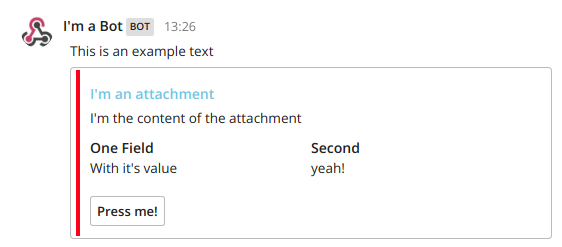eclaboratorio / mattermost-bot
Collection of classes to implement Incomming Webhooks, Outgoing Webhooks and Slash commandas for mattermost using PHP
Installs: 98
Dependents: 0
Suggesters: 0
Security: 0
Stars: 2
Watchers: 2
Forks: 0
Open Issues: 0
pkg:composer/eclaboratorio/mattermost-bot
Requires
- php: >=7.1.0
This package is not auto-updated.
Last update: 2026-02-15 13:01:35 UTC
README
Mattermost PHP is a compilation of tools to help you develop Bots, webhooks or other applications for Mattermost. It provides code to easily send complex messages to MM with Attachments, actions (buttons)... receive and parse webhooks and a simple wrapper to make bots. Also there is an API connector under development (any help is appreciated via Pull request)
Requirements and Install
MattermostBot could be installed via composser.
$ composer require eclaboratorio/mattermost-bot
It requires php<=7.1
How to use Mattermost Bot
Here you could find some easy examples
Send a message to Mattermost
//Webhook url provided when you create a new slash command $webhookUrl = 'https://yourMMserver.com/wooks/xxxxxxx'; $response = new \MattermostBot\Response(); $response->setText("This is an example text"); $response->setUsername("I'm a Bot"); $response->setChannel("@isoria"); //Create the attachment with it's options $attachment = new \MattermostBot\Attachment(); $attachment->setTitle("I'm an attachment"); $attachment->setText("I'm the content of the attachment"); $attachment->setTitleLink("https://www.elconfidencial.com"); $attachment->setColor("#ff0000"); $attachment->addFieldByText("One Field","With it's value",true); $attachment->addFieldByText("Second","yeah!",true); //Add a button $action = new \MattermostBot\AttachmentAction(); //The callback could be parsed with IncomingAction class $action->setUrl("https://example.com/webhookUrl/called-when-pressed"); $action->setName("Press me!"); //Values attached to context are sent to the button webhook and parsed by IncomingAction $action->attachToContext("param1",'value1'); $action->attachToContext("another_param",'asdf'); //Add the button to the attachment $attachment->addAction($action); //Attach the attachment and send $response->addAttachment($attachment); $response->sendIncomming($webhookUrl);
Receive a slash command
To parse a Incoming slash message just create a new IncomingSlash
$message = new \MattermostBot\IncomingSlash();
| Var | Value |
|---|---|
| Text | $message->getText() |
| Token | $message->getToken() |
| UserName | $message->getUserName() |
| Command | $message->getCommand() |
| ChannelId | $message->getChannelId() |
| ChannelName | $message->getChannelName() |
| TeamDomain | $message->getTeamDomain() |
| UserId | $message->getUserId() |
Make a simple slash command bot
To simplify the development and implement some security good practices there's a bot wrapper
Your webhook url
$message = new \MattermostBot\IncomingSlash(); $allowedTokens = ['1ifucdyn1pb1cdz1bk8dmkiqjc']; //Empty array means everybody could call the bot //The usernames wothout the @ $allowedUsers = ['myuser']; $bot = new TestBot($message, $allowedTokens, $allowedUsers); if ($bot->execute() === false) { echo "Bot execution fails"; } else { echo "It works!"; }
Bot File
class TestBot extends \MattermostBot\BaseBot { //Any bot should implement a process function. //It is call after checking the user is allowed to run the command protected function process() { $response = new \MattermostBot\Response(); $response->setResponseType(\MattermostBot\Response::RESPONSE_IN_CHANNEL); $response->setUsername("TestBot"); $msg = "| Var | Value | | :------------ |:---------------| | Text | {$this->message->getText()} | | Token | {$this->message->getToken()} | | UserName | {$this->message->getUserName()} | | Command | {$this->message->getCommand()} | | ChannelId | {$this->message->getChannelId()} | | ChannelName | {$this->message->getChannelName()} | | TeamDomain | {$this->message->getTeamDomain()} | | UserId | {$this->message->getUserId()} |"; $response->setText($msg); $this->sendMessage($response); }

